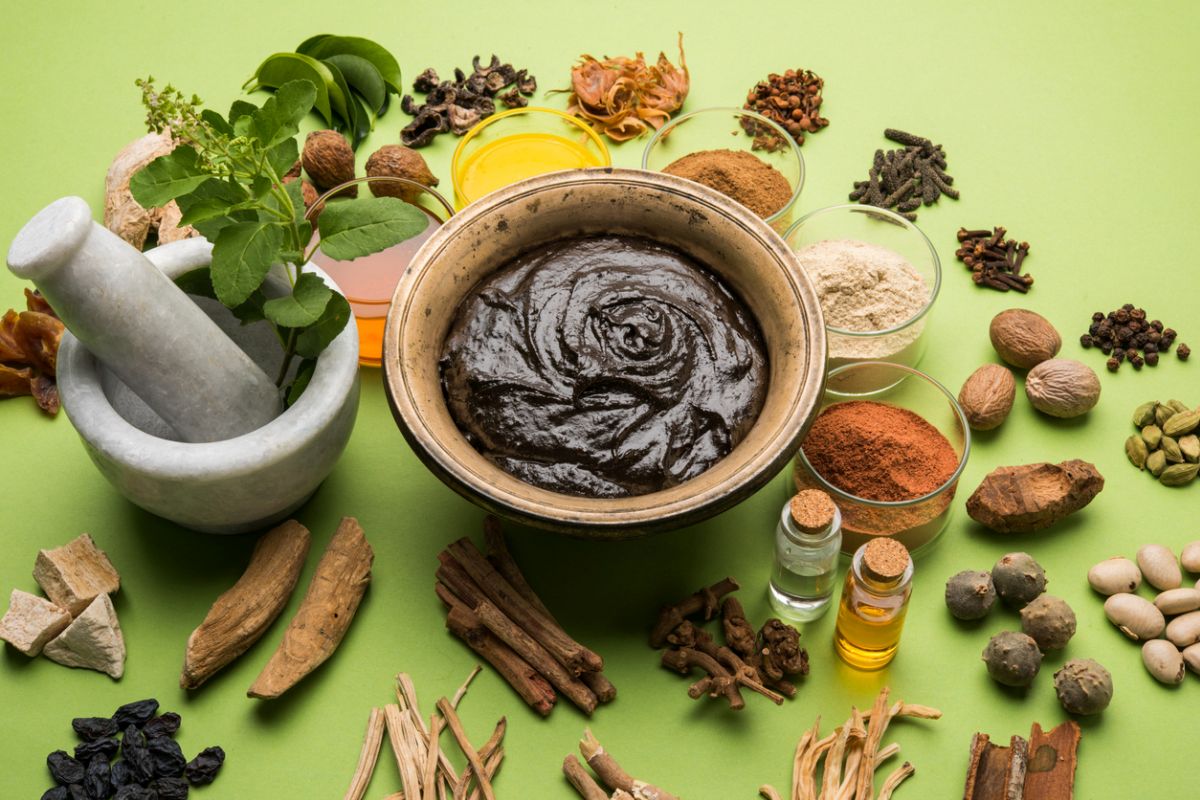At Samwarthika, we specialize in providing comprehensive and holistic Ayurvedic treatments for thyroid disorders in Kerala. The thyroid gland plays a pivotal role in regulating various bodily functions, and any imbalance can result in a range of health issues. Our highly experienced Ayurvedic doctors in Kerala possess a deep understanding of individual needs, offering personalized therapies to restore thyroid health.
Ayurveda and Thyroid Disorders
Although there is no absolute cure for thyroid issues in women, Ayurveda offers a range of healthcare recommendations and practices aimed at maintaining optimal thyroid function in the long term.
Just as it does for various health concerns, Ayurveda addresses thyroid imbalances by examining them through the lens of doshas.
Hypothyroidism is categorized into five types, depending on whether it is primarily caused by Vata, Pitta, Kapha (representing the Air, Fire, and Water elements within the body), urinary tract infections (more common in females), or the “goiter” type, which is characterized by noticeable swelling of the thyroid gland around the neck. The advanced stage of Kapha-induced hypothyroidism is often referred to as the “goiter” variety. Additionally, Vata-induced thyroid conditions encompass a psychological component linked to mental agitation and stress, as well as a physical component linked to excessive physical exertion. On the other hand, Pitta is solely responsible for hyperthyroidism.
In Ayurveda, treatment is prescribed after identifying the root cause of the disorder. For instance, if you have a thyroid condition, Ayurvedic remedies will focus on restoring balance to the Kapha dosha. Consequently, Ayurveda adopts a personalized approach to patient care. Chronic conditions like thyroid disorders can benefit significantly from Ayurvedic principles and practices.
Ayurvedic Thyroid Treatment in Kerala at Samwarthika
Whether you are dealing with hyperthyroidism or hypothyroidism, thyroid issues can disrupt your appetite, trigger anxiety, and lead to sudden weight fluctuations. At Samwarthika, we offer a holistic Ayurvedic approach to address thyroid conditions. Our treatment combines dietary adjustments, herbal remedies, lifestyle modifications, and yoga practices to restore balance and strengthen the functioning of the thyroid gland.
Our Ayurvedic treatment for thyroid in Kerala is designed to help you manage stress levels and regulate thyroid hormones in the body. It focuses on enhancing overall body functionality through the use of natural herbs, therapeutic techniques, and massages.
Our experienced doctors at Samwarthika tailor treatment plans to the specific needs of each individual. Here’s an overview of our Ayurvedic thyroid treatment in Kerala:
Proper Diet Plan: Our Kerala-based doctors may recommend dietary changes to support thyroid health. This typically involves emphasizing whole foods, avoiding processed and refined foods, and increasing the intake of iodine-rich foods.
Herbs: Traditional Ayurvedic herbs such as ashwagandha, guggulu, and shilajit are used to support thyroid function. These herbs are believed to help balance thyroid hormone levels, reduce inflammation, and promote overall well-being.
Yoga and Meditation: Stress is a known factor that can affect thyroid function. We incorporate yoga and meditation practices to reduce stress and promote relaxation. Specific yoga asanas, like the shoulder stand and fish pose, are believed to stimulate thyroid function.
Ayurvedic Remedies: Our Ayurvedic thyroid treatment options include therapies like Abhyanga (herbal oil massage), Panchakarma (detoxification therapy), and Nasya (nasal administration of herbs and oils) to further support thyroid health.
Our aim is to restore balance to the body and address any underlying imbalances contributing to thyroid gland dysfunction. For a free consultation about our Ayurvedic treatment for thyroid in Kerala, you can reach out to Samwarthika via phone, WhatsApp, or email. Our highly experienced and qualified Ayurvedic doctors are here to assist you on your journey to thyroid wellness.

Tips for Preserving Thyroid Health
Maintaining a healthy thyroid is crucial for overall well-being. Here are some valuable tips to help you preserve thyroid health:
Balanced Diet: Consume iodine-rich foods like seafood and dairy, as well as selenium-rich foods like nuts and seeds. A well-rounded diet supports thyroid function.
Limit Goitrogens: Goitrogenic foods like cruciferous vegetables (e.g., broccoli, cabbage) can interfere with thyroid function when consumed in excess. Cooking these foods can reduce their impact.
Adequate Iodine: Ensure you get enough iodine, but not excessive amounts. Consult a healthcare provider for guidance, as iodine requirements vary.
Manage Stress: Chronic stress can affect thyroid health. Practice stress-reduction techniques like meditation, yoga, or deep breathing exercises.
Regular Exercise: Engage in regular physical activity to support metabolism and maintain a healthy weight, which can benefit thyroid function.
Limit Soy: Excessive soy consumption may impact thyroid function. Consume soy in moderation and consult a healthcare provider if you have concerns.
Thyroid Screening: Periodic thyroid function tests can detect issues early. Discuss with your healthcare provider and monitor thyroid health as needed.
Adequate Sleep: Prioritize quality sleep to support overall hormonal balance, including thyroid hormones.
Avoid Excessive Fluoride: High levels of fluoride can affect thyroid function. Ensure your drinking water doesn’t contain excessive fluoride.
Consult a Specialist: If you suspect thyroid issues or have a family history of thyroid problems, consult an endocrinologist or thyroid specialist for personalized guidance.
Remember, maintaining thyroid health is essential for overall well-being, and these tips can help you support a healthy thyroid gland.

Some individuals with thyroid disorders may not exhibit noticeable symptoms or may have mild symptoms that can be easily overlooked. Therefore, if you suspect you may have a thyroid disorder, it’s crucial to consult with a healthcare provider for a proper diagnosis and appropriate treatment.
Frequently Asked Questions
What Food Should I Avoid to Treat the Thyroid?
For individuals with thyroid disorders, there are certain foods that should be limited or avoided to help manage the condition effectively. Arogyadham doctors in Kerala recommend the following foods to avoid for better thyroid management:
Soy: Soy products contain goitrogens, compounds that can potentially disrupt thyroid function and iodine absorption. If you have hypothyroidism, it is advisable to limit your consumption of soy-based foods like soy milk and tofu.
Gluten: Some individuals with thyroid disorders may also have gluten intolerance or celiac disease. Gluten, a protein found in wheat, barley, and rye, can lead to inflammation and damage the small intestine. It’s advisable to avoid gluten-containing foods like bread, pasta, cereals, and beer if you suspect gluten intolerance.
Cruciferous Vegetables: Cruciferous vegetables, including broccoli and cauliflower, contain goitrogens that have the potential to interfere with thyroid function. While these vegetables offer numerous health benefits, it’s advisable to consume them in moderation or after cooking, as cooking can help reduce the goitrogenic compounds.
Processed Foods: Processed foods are often high in sodium, which can lead to water retention and exacerbate symptoms of hypothyroidism. Additionally, they tend to be rich in sugars and unhealthy fats, contributing to weight gain and inflammation. Reducing or eliminating processed foods from your diet is beneficial for thyroid health.
Alcohol: Alcohol can negatively affect thyroid function and the metabolism of thyroid hormones. It may also contribute to dehydration, which can worsen symptoms of hypothyroidism. Moderation or avoidance of alcohol is advisable for individuals with thyroid disorders.
It’s important to note that dietary recommendations for thyroid disorders may vary based on individual factors and the specific type of thyroid condition. Consultation with a healthcare provider or registered dietitian is recommended to create a personalized dietary plan that best suits your needs and helps manage your thyroid disorder effectively.
What are Some Common Ayurvedic Herbs Used for Thyroid Users?
Ayurvedic herbs have a long history of traditional use for supporting thyroid function and managing thyroid disorders. At Samwarthika, our experienced doctors incorporate the following Ayurvedic herbs into our treatment protocols for thyroid disorders:
Ashwagandha: Ashwagandha is a potent herb known for its adaptogenic properties. It aids the body in adapting to stress and is believed to help balance thyroid hormone levels, potentially reducing inflammation and supporting overall thyroid health.
Guggulu: Extracted from the Commiphora mukul tree, guggulu possesses anti-inflammatory and antioxidant properties. It has a traditional role in promoting thyroid function and is used in the treatment of hypothyroidism.
Shilajit: Shilajit is a mineral-rich substance known for its rejuvenating properties. It is thought to support thyroid function and enhance energy levels, contributing to overall well-being.
Triphala: Triphala is a combination of three fruits: amla, haritaki, and bibhitaki. It is traditionally employed to support holistic health and well-being, which includes maintaining optimal thyroid function.
Brahmi: Brahmi is an herb that helps the body cope with stress and fosters overall health. It is believed to play a role in balancing thyroid hormone levels and improving cognitive function, among other benefits.
Our Ayurvedic treatment protocols at Samwarthika harness the potential of these time-honored herbs to address thyroid disorders while considering the individual constitution and specific needs of each patient. It’s important to note that Ayurvedic treatments should always be administered under the guidance of qualified Ayurvedic doctors to ensure safety and effectiveness.

